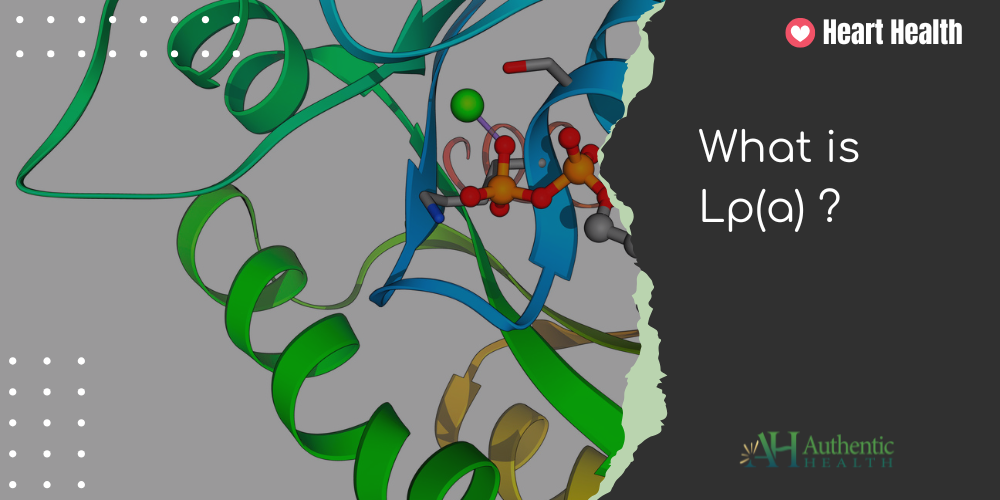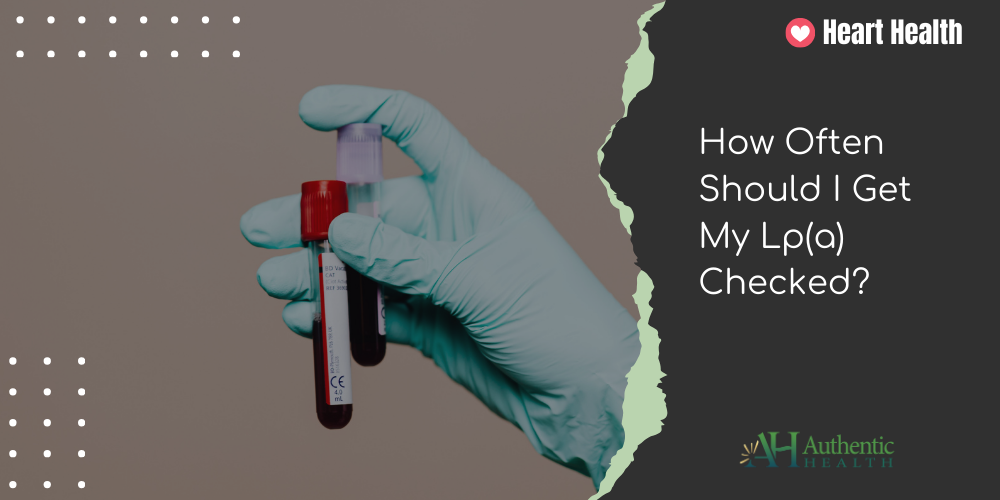February is Heart Health Month! Here’s a list of topics we’ve done in the past on heart disease!
Sign up for our Authentic Health Heart Assessment (only available in February 2025!)
I did an extensive review of heart disease in a blog series back in 2024, CHECK IT OUT HERE.
Podcasts with Dr. Jackson on Heart Health:
Endothelial Health Masterclass (Part 1)
Endothelial Health: Enhancing Cardiovascular Health (Part 2)
Today, I want to talk about a very specific lab test that can automatically increase your heart disease risk from low to high. The lab test is called Lp(a) (pronounced L-P-little-A).
I’m sure all of you have read articles about famous people or high-profile CEOs having a surprise heart attack or stroke in their 40s or 50s. Maybe you have family members with evidence of early heart disease, defined as a heart attack or stroke <55yrs old for men or <65yrs old for women. If I were a betting man, I’d bet that all of these instances involve Lp(a).
Fast Facts about Lp(a):
- Lp(a) is a genetic risk factor, and 20% of the population carries this gene.
- <1% of people with Lp(a) actually know that they have it.
- Most physicians (including cardiologists) don’t routinely check for it
- The presence of Lp(a) increases risk of plaque formation, vascular inflammation, blood clots, and disease of your heart valves.
- Lp(a) increases your risk of heart disease doubles to quadruples your baseline risk, depending on how high it is.
- Lp(a) is more common in Black and South Asian populations
- We have no known way to lower Lp(a) naturally — but medications are coming!

What is Lp(a) exactly, why do we have it, and why is it a problem?
If you have the genes to make Lp(a), your body will produce these particles in your liver and attach them to LDL particles. We don’t really know why Lp(a) has survived in our gene pool since it increases heart disease risk but there are 2 theories:
- It helps the immune system by collected inflammatory debris as it travels through the blood stream.
- It may help with wound healing by increasing cholesterol delivery to sits of injury.
But herein lies a few problems:
- Lp(a) can also be directed to sites of injury within the vessel wall. As it comes in to “help”, it gets stuck within the wall of the artery and cannot escape. If these particles were carrying a lot of inflammatory debris, now you have a highly inflamed cholesterol particle hanging out in your artery wall where it isn’t supposed to be! This activates the immune system, which contributes to accelerated plaque formation.
- The other problem with Lp(a) is that, since it is genetic, it is floating around in your bloodstream when you are a baby. For everyone, heart disease is a problem of time — it takes 20-30 years for heart disease to progress to the point of causing a heart attack or stroke. For those with Lp(a), however, the clock starts MUCH earlier — in their elementary to teenage years and accelerates future risk (think of it like lighter fluid) — even if the person is otherwise “healthy.”
- Lastly, no amount of lifestyle change or currently available drug can lower Lp(a). The best way to deal with Lp(a) is to reduce your risk of heart disease across the board. By doing so, you “take the teeth out” of Lp(a), so to speak.

How do I know if I have it?
Predictors of Lp(a):
- If you have a family history of early heart attack, stroke, or aortic valve replacement, especially if it seems like it is all from one side of the family, then there’s a very high chance you have Lp(a).
- If you don’t know your family history but have had imaging of your heart and found plaque and you’re <55yrs old for a male, <65yrs old for a female, then you may have Lp(a).
- If you are Black or South Asian, there is a higher likelihood of you having Lp(a)
So, if you fall into one of those categories or you just want to know if you have it or not, you can get checked with a simple blood test. Checking for Lp(a) is now standard of practice for children in Europe but hasn’t seen the same adoption here in US Guidelines. Most of the time, I see Lp(a) checked AFTER someone has had an unexpected heart attack or stroke.

Should I get my Lp(a) checked? If so, how often?
No question. Heart attack is the number 1 reason and stroke the number 5 reason for death in America. Being armed with as much information about your heart as possible is an important first step when it comes to taking your hearth health seriously. Knowing what we are up against makes the fight a more manageable and successful one.
Almost all lab companies test for Lp(a) with a simple blood test. I’m not sure about insurance coverage but is <$50 if you got it outside of insurance. The best thing about Lp(a) is that it is a one-time lab test. Since it is genetic and cannot be influenced by lifestyle changes, it won’t fluctuate too much. If it’s elevated (>50mg/dL), it’ll always be elevated. If it is low, it’ll always be low.
What’s the future on Lp(a)?
We have a few drugs in the research pipeline that have shown incredible preliminary results at dramatically lowering Lp(a) levels with very little side effects. These should be coming out in the next few years and will be a game-changer in cardiac care and prevention of heart disease.








